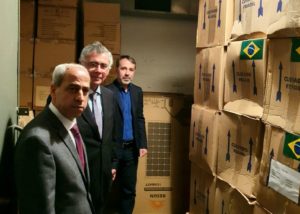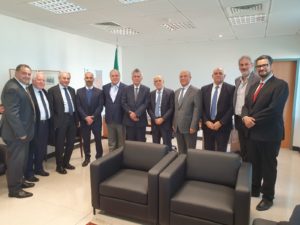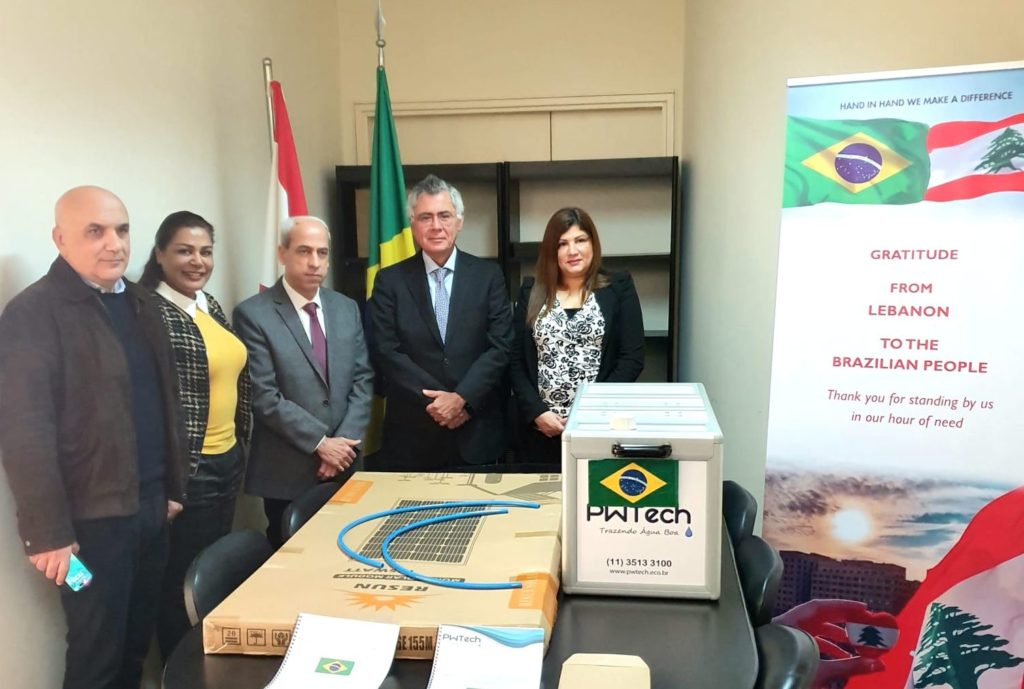São Paulo – The Brazilian government donated 38 water purifiers to Lebanon; they can filter 200,000 liters a day each. The pieces of equipment will be installed in schools and hospitals and are expected to help fight the cholera outbreak faced by the Arab country, which is experiencing a severe economic crisis. The donation was delivered on Thursday (2) by the Brazilian ambassador to Beirut, Tarcísio Costa (pictured above).
The purifiers are powered by solar panels, which were included in the donations with batteries and spare parts. They will be bound to the region of Tripoli, one of the most affected by cholera. “This is of great importance for a country facing this serious crisis and with an outbreak of cholera affecting the poorest regions,” said Costa in an interview with ANBA.

The ambassador delivered the equipment to the Lebanese government in an event with the secretary-general of the High Relief Committee of Lebanon (HRC), general Mohammad Kheir, who received the purifiers accompanied by representatives of Lebanese non-governmental organizations (NGOs) collaborating with the local government in humanitarian aid to the country.
The ambassador stated Brazil has an active and well-organized international cooperation policy in its budget as a developing country under the coordination of the Brazilian Cooperation Agency (ABC), a Ministry of Foreign Affairs branch. The ABC conducted the donation of purifiers to Lebanon.
Brazilian cooperation reaches different regions of the planet, including Lebanon. Costa cited among the reasons for this cooperation the sizeable Lebanese community in Brazil, the importance of the Arab country in the region, and the historical ties that can be traced to around 150 years ago. “What is certain is Lebanon is an important country for Brazil and is going through a moment of serious hardship and a severe economic crisis,” said Costa.
A harsh economic downturn, very high inflation, and high unemployment are some of the challenges Lebanon encounters today, a situation made worse by the explosion in the Port of Beirut in August 2020, which left over 200 dead and thousands injured amid the COVID-19 pandemic situation. Ambassador Costa claimed Brazil’s response has been emphatic, and humanitarian cooperation has been strengthened – Brazil also has technical collaboration with Lebanon.
After the explosion, aid efforts were deployed, including sending 4,000 tonnes of rice from Brazil to Lebanon and approving parliamentary amendments for cooperation in fire prevention, resilience to disasters in urban areas, and traumatology and orthopedics. Medicines are expected to be received soon. The rice shipment was approved during a visit to Lebanon by the former president of Brazil, Michel Temer, of Lebanese descent.
Costa said during the delivery, there was an emphatic gratefulness for the donation of purifiers and recognition of the importance of Brazilian aid. On the occasion, the ambassador spoke to attendees about Brazilian international cooperation, which is rooted in the needs identified by the country and not developed under conditionalities. “We are not requesting Lebanon to become an ally of Brazil in any major geopolitical undertaking, and that makes a big difference,” explained Costa to ANBA.

First activities
The delivery of the donation was Tarcísio Costa’s first official appointment in Lebanon after taking office as ambassador to the country about two weeks ago. The diplomat also met this Friday (3), with the president of the Brazil-Lebanon Business Council, Rabih Frem, along with other board members. According to a press release by the Brazilian Embassy in Lebanon, Costa expressed his fulfillment with the council’s role in strengthening commercial and economic ties between Brazil and Lebanon.
Read more:
Brazil’s new ambassador to Lebanon to focus on cooperation
Translated by Elúsio Brasileiro




